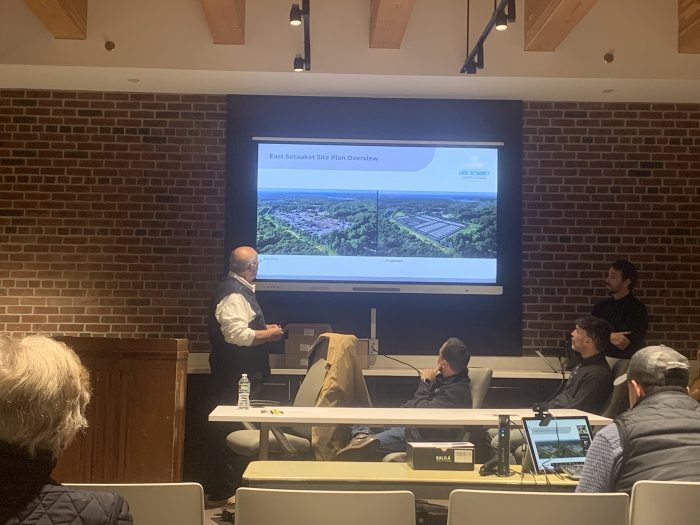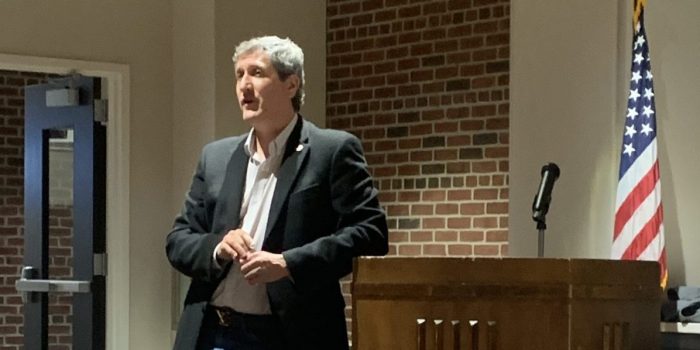By Sabrina Artusa
At a recent Three Village Civic Association meeting, Brookhaven Town Councilmember Jonathan Kornreich (D-Stony Brook) announced the formation of a new battery energy storage advisory committee consisting of scientists, fire department representatives, school superintendents and civic leaders.
The advisory group substitutes for an official Town of Brookhaven task force, as suggested by the New York State Research and Development Authority. NYSERDA’s Battery Energy Storage Guidebook recommends creating a task force representing “interested stakeholders” to help create or amend the protocols, processes and strategies involved in implementing a battery energy storage system.
“The Town of Brookhaven at large has not made a battery advisory task force as recommended by NYSERDA,” Kornreich said. “So I am making my own.”
With several engineers to help navigate the technicalities, scientists to analyze alternate forms of energy storage, civic leaders like Three Village Civic Association President Charles Tramontana to tap into the sentiments of residents, and local school superintendents who are looking out for the next generation, the task force aims to disseminate their findings, dispel misinformation and scrutinize the systems from various industry perspectives.
“The goal is to really make information available to everyone,” said Nancy Goroff, a retired professor of chemistry at Stony Brook University and former trustee for the Long Island Power Authority. “From my point of view a key aspect is figuring out what conditions, what parameters must be met in order for the battery energy storage systems to be safe. If we decide there are not a set of parameters for it to be safe, then we would recommend against building. I think it is more likely that we will come up with a list of parameters and conditions that can be met for the committee to make a consensus. “
“It is always better to have more information than not enough,” said Three Village civic member George Hoffman, who is pleased that a task force has been formed and commended Kornreich on the initiative. “I think it will make the public more comfortable.”
The group is tasked with comparing the facilities with peaker plants, a power plant that activates during times of high demand, considering alternative technologies and analyzing existing and emerging codes and safety measures.
“I have reservations about lithium batteries,” said Kornreich at the civic meeting. ”But, I am not an expert on batteries and in the vacuum of policymaking a lot of info that informs policymaking decisions, not just here but everywhere, seems to come from people who have vested interest one way or another.”
With three proposed facilities in his district, Kornreich is concerned about the spread of misinformation. Organizing a group of “high level people who can really dig into this and study it” is a step toward developing a more complete and informed determination on the systems.
In Port Jefferson Station, New Leaf Energy is proposing an 8.75-megawatt system while Savion has proposed two facilities in Setauket, 373 megawatts and 65 megawatts.
Goroff said that anticipating and measuring safety risks is a big concern of the group. Already she has started to form ideas on how to mitigate risk by using information about previous fires. For instance, she said that by looking at BESS Failure Incident Database, she estimates that “the time of installation is the riskiest time for a fire” and that the group may make recommendations for certain standards in the installation process to address that.
Goroff acknowledged that some public discourse is “inaccurate and greatly exaggerates the risks.”
“At the same time,” she continued, “there are real risks and we want to make sure that those are reduced. We also need to get our arms around how big the real risks are separated from the misinformation and disinformation.”
The group has had one meeting so far, with another soon approaching. They aim to have a report of recommendations by the end of June.
“I do believe that it is possible to build BESS in a safe way,” Goroff said.






